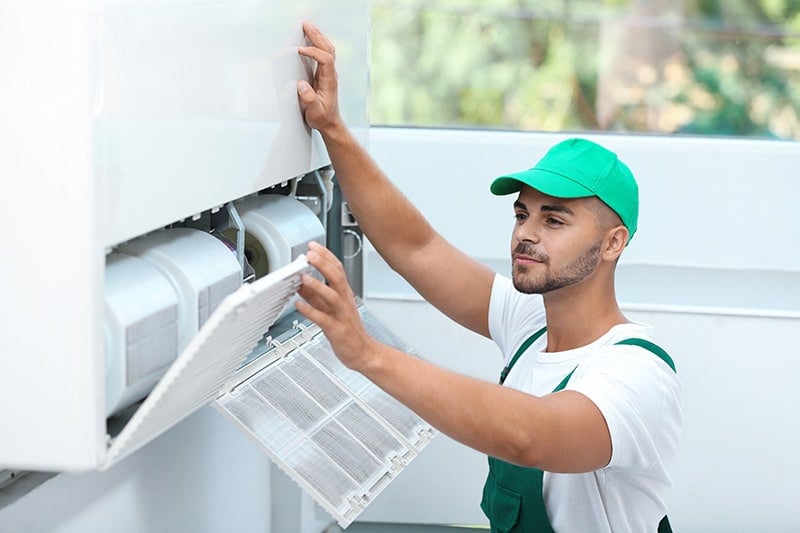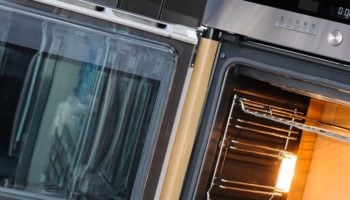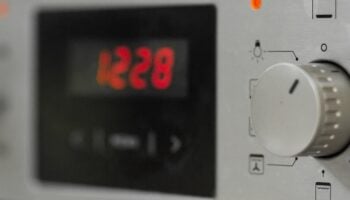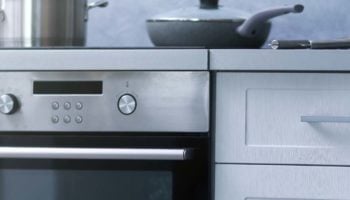We've independently reviewed this article to make sure it's as accurate as we can make it.
To find out more about our article creation and review process, check out our editorial guidelines.
Is your oven making a clicking noise, and you have no idea why?
In my experience, an oven will click normally when it cycles between the broil and bake elements. By cycling its different elements, your oven maintains an appropriate temperature. However, there are also other possibilities worth considering.
Luckily, I’ve already taken care of all the research and would like to share my findings with you. Below, you’ll find an article including all the information you’ll need to determine whether the clicking is normal and what you can do in case it’s not.
Ready? Let’s solve this mysterious clicking noise.
Why trust us? This article was written by Craig Anderson and James Blackford.
Craig has helped thousands of other homeowners repair their appliances since 2016.
James is one of our resident appliance experts with over 16 years of experience. He currently works as a Master Technician for SquareTrade, and runs his own appliance repair business.
A Clicking Oven Might Be Normal
Before diving into the main causes and solutions behind your clicking oven, it’s important to clarify that not all clicking noises are bad news.
Sometimes, the clicking noise is just your oven heating up or cooling down – you’ll know that’s the case when it sounds similar to your car’s engine after driving for a while.
Whenever you’re working with metal and heat, you’re bound to hear creaking and other sounds as the material expands with the heat and then contracts when cooling down. The best way to tell whether you have a problem is to listen carefully.
If the sound is not electrical in nature but rather seems to be the metal expanding and contracting, your oven is likely working normally. Watch closely to see if the oven only clicks when heating up and after being turned off. If so, you have nothing to worry about.
Provided you determine the clicking noise is NOT related to temperature changes, here are some things to consider.
#1 Your Oven Is Changing Cycles
The first reason why your oven might be making a clicking noise is cycling between its internal elements. Most ovens typically have two main elements – the bake and broil elements.
You will hear a clicking noise when your oven moves from element to element. If you hear your oven click while you are using it, then it’s likely due to the cycling of the elements.
#2 Long Idle Times
Long idle times could also explain why your oven is making a clicking noise, as there could be a lot of air in the lines. When there’s built-up air, your oven needs time to clear it before it can work normally again.
After the air has been cleared from the lines, gas can flow through them again. Then, your oven will turn on, causing the cooking process to start.
#3 A Stuck Ignition Switch
If your oven keeps making a clicking noise, it could also be a sign that something’s wrong with theignition switch. In electric ovens, the ignition switch creates a small spark that makes fire in reaction to gas.
Under normal circumstances, the ignition switch should only click when you press the button for it and stop when you let go. However, if there’s anything wrong with the switch, it could randomly send electricity to the stove.
A malfunctioning ignition switch is not something you should take lightly, as it could start a fire. If you suspect your oven is making a clicking noise because of a bad ignition switch, my usual advice is to call a professional to deal with the problem.
It should also be noted that there are two different types of ignition switches. You have the spark ignition that clicks and the glow plug type that heats up until it triggers the gas valve to open. The glow plug ignition switch type won’t ever click.
#4 A Faulty Bad Door Lock
Yet another reason why your oven might be making a clicking noise is a faulty door lock. Depending on your oven model, you might not have a door lock.
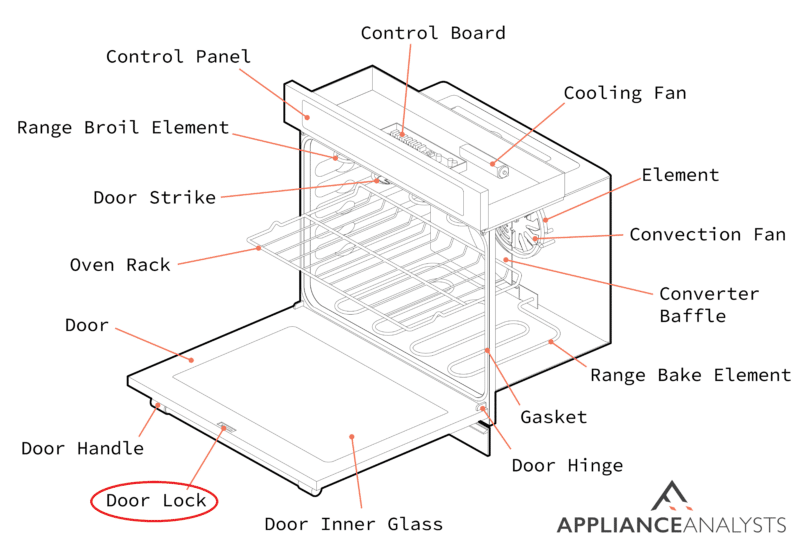
From what I’ve seen, only ovens with a self-cleaning option have door locks, so if yours does not have this feature, then you’re likely in the clear.
A continuous clicking noise coming from your oven’s door lock can be an indication that the part is failing and is constantly spinning around, trying to determine whether it’s in the right position. In most cases, if you can live with the clicking sound and have no children at home that can open the door during a cleaning cycle, you can ignore the issue safely.
#5 A Bad Fan
The last possible reason why your oven is making a clicking noise is a bad fan. Your oven fan is responsible for circulating the hot air inside the oven cavity and helping blow it out to prevent overheating.
When the fan fails, a long list of problems can arise, including uneven cooking, overheating, and of course, the mysterious clicking noise. As with the door lock, unless you notice any other symptoms aside from the clicking, you can ignore the situation safely.
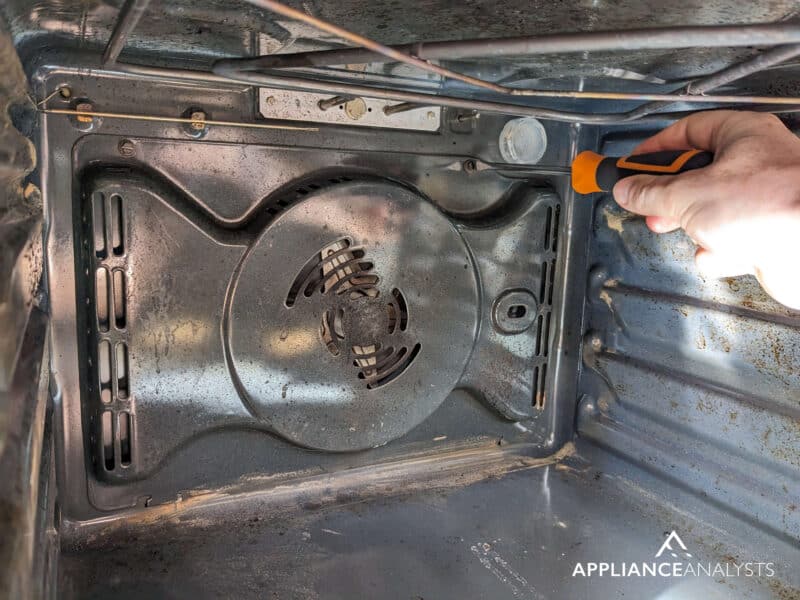
You can also call a technician to handle the repair for you. But, in my opinion, you should try to fix the problem yourself if you so wish, as the average fan repair can cost anywhere from $400-$700.
Depending on the oven brand and model you own, replacing the oven fan could be as simple as undoing a couple of screws and removing a back panel, to a complex process involving circuitry. If things get too complex, my advice is to bite the bullet and call a pro.
If you want to get any replacement part – or see how much one would cost – click to enter your model number in the search bar below. Our partners at AppliancePartsPros stock almost every part with free guides on how to install them.

Will the Oven Keep Clicking if You Forget to Turn It Off?
There is a chance that your oven may start to click if you forget to turn it off. Of course, you should make sure you turn off the oven when you are done with it, as otherwise, you could be looking at high utility bills and even the risk of fire.
Your oven will continue to maintain the temperature it was set at if you do not turn it off and will cycle through several elements to maintain its current temperature. So, as long as every other item on the list above has been ruled out as an indication that something is wrong, the clicking from cycling is completely normal.
Conclusion
That about covers it!
When your oven is making a clicking noise, it’s typically nothing serious. Usually, clicking indicates that your oven is rotating through several cycles; however, it could also indicate something is wrong with your oven.
If you hear a clicking noise and your oven is not starting, you should reach out to an expert who can help you. That way, they can figure out exactly what the problem is while also eliminating a potential safety concern.
I hope you enjoyed this in-depth article on why your oven is clicking. If you’d like to learn more about how your oven works, check out a few related articles below and consider subscribing to our newsletter.
Have a great day!
-Craig.

